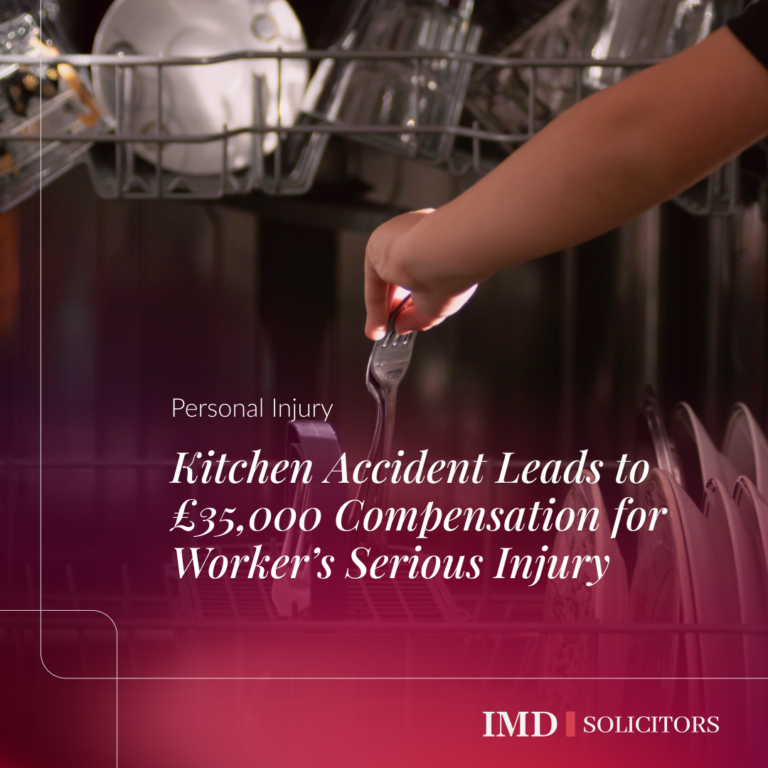Speak to a member of our specialist international team of UK personal injury lawyers today on 0330 107 0107.
This case arose from a serious workplace injury sustained by a kitchen assistant employed by a UK charity. The client, a Polish national, was undertaking routine kitchen duties when she suffered a deep laceration to her right index finger. The injury resulted in permanent stiffness and disrupted her intended career path in the culinary sector. IMD Solicitors LLP were instructed to pursue a personal injury claim on her behalf. This is a case example of employer liability arising from failure to ensure safe working practices, provide adequate protective equipment, and manage employee responsibilities in a high-risk environment.
Summary of the Incident
On the date of the accident, the claimant was engaged in her usual kitchen duties, which included loading and unloading an industrial dishwasher. The kitchen environment was large-scale and operated under significant pressure due to the volume of meals prepared daily. Unaware that, after loading the dishwasher with a batch of dishes and utensils, a colleague inserted additional items and activated the washing cycle.
When the dishwasher completed its cycle, the claimant proceeded to unload it. As she reached in, her hand came into direct contact with the broken glass jar, which had split completely in two due to the high temperatures and pressure inside the machine. The resulting injury to her right index finger was extremely severe: deep lacerations exposed both the tendon and bone. Emergency medical treatment was required, including reconstructive surgery and a prolonged period of physiotherapy.
Legal Issues and Liability
This claim raised several key legal issues:
- Failure to Provide Personal Protective Equipment (PPE):
The claimant had not been provided with any form of hand protection, such as cut-resistant gloves, which could have mitigated or prevented the injury entirely. Under the Personal Protective Equipment at Work Regulations 1992, employers have a statutory duty to provide suitable PPE where there is a risk to health and safety that cannot be adequately controlled by other means. - Unsafe System of Work and Lack of Supervision:
The employer failed to implement or enforce a safe system for loading and unloading the dishwasher. No procedure was in place to inspect items placed into the machine, nor was there any warning system for breakages occurring during the wash cycle. - Contributory Negligence Defence (Rejected):
The defendant initially resisted liability, with suggestions that the claimant might have contributed to her own injury by placing the jar in the dishwasher. However, witness testimony confirmed that another staff member had added items to the machine after the claimant, absolving her of responsibility. The absence of any warnings or checks by the employer ultimately left them fully liable.
Injury and Medical Treatment
The injury had a profound impact on the claimant’s life. As an aspiring chef, manual dexterity and full use of both hands were crucial to her profession. Following reconstructive surgery, the claimant underwent intensive physiotherapy, funded by the defendant after admission of liability. Despite this, the finger remained partially stiff, limiting her ability to perform complex kitchen tasks.
Career Impact and Rehabilitation
Prior to the accident, the claimant had been pursuing a career in culinary arts. However, following the injury, she was physically unable to continue along that path. Fortunately, she had begun exploring a transition into an administrative role. The injury accelerated that shift, and she is now employed in an office-based position with the same charity, where she is functioning well and reported to be content with her current circumstances.
Settlement
The claim was settled for £35,000, which accounted for:
- General damages for pain, suffering, and loss of amenity.
- Special damages for loss of earnings, cost of medical treatment, and rehabilitation.
- Consideration of future loss of earnings, particularly due to the impact on her ability to pursue her original career path.
This settlement was achieved without the need for protracted litigation. Following witness statements and disclosure of relevant evidence, the defendant accepted responsibility. The negotiated compensation reflected both the physical and psychological consequences of the injury.
Key Legal Takeaways
- Employers Must Anticipate Risks in High-Turnover Environments:
Workplaces such as industrial kitchens, where multiple employees share equipment and operate under time pressure, require safety procedures to prevent preventable accidents. - Witness Evidence:
Establishing liability hinged on third-party witness statements confirming that another employee introduced the hazardous item. Early collection of such evidence is important. - Failure to Provide PPE Is a Clear Breach of Statutory Duty:
The workplace’s failure to conduct risk assessments and implement appropriate protective measures. In particular, cut-resistant gloves are inexpensive and could have prevented serious injury. - Rehabilitation as a Component of Compensation:
The funding secured for physiotherapy played an important role in the claimant’s recovery and transition back to work. - Career Disruption Must Be Carefully Quantified:
Although the claimant ultimately secured alternative employment, the loss of opportunity in her chosen profession was factored into the final settlement. Accurate assessment of vocational impact strengthens claims and ensures fair compensation.
Conclusion
Through proactive legal representation, IMD Solicitors LLP secured not only financial compensation but also essential rehabilitative support for the claimant. The successful resolution of this case shows the firm’s commitment to protecting the rights of injured workers and ensuring that their long-term needs are fully addressed.
This article is for general information only and does not constitute legal or professional advice. This article was created on 08/09/2025. Please note that the law may have changed since this article was published.


